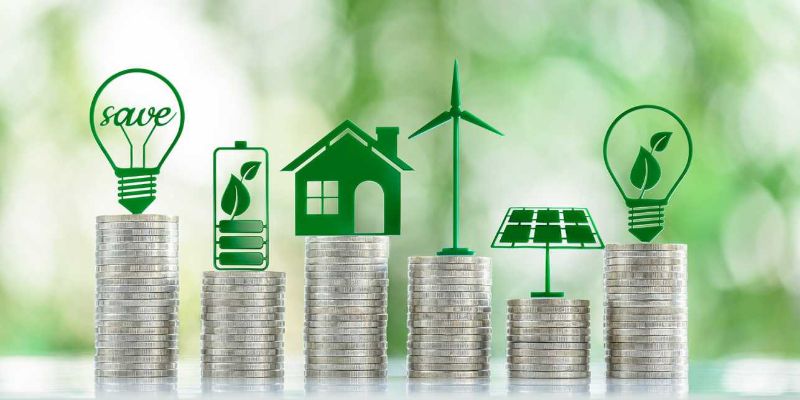Climate protection benefits the economy
Until recently, it appeared that the transition to clean energy would come at a net economic cost, to a large extent because renewable energy systems, including their needs for energy storage, do and will continue to cost somewhat more to build and operate than fossil-based systems.
The Intergovernmental Panel on Climate Change (IPCC), for example, has projected that it would reduce economic growth by about 0.04% annually.1 To put this into perspective, someone earning CHF 100’000 would earn CHF 102,000 next year under 2% economic growth, but only CHF 101,960 with a strong climate policy. A study recently released by the Swiss Federal Office of Energy reached a similar conclusion.2 To justify a transition to clean energy on economic grounds, one would need to consider the economic benefits of averting a climate catastrophe.
Some people have reasons to believe, however, that the transition to clean energy could benefit us economically, even without taking averted climate change impacts into account.
The integrated assessment models (IAMs) that the IPCC and many others have relied on to project the economic costs of climate protection assume that people will always invest in the least expensive energy supply choice at any point in time, and that the primary policy that the government will use to direct an ever-increasing share of investment towards low-carbon technologies is a rising carbon tax. With these assumptions, the IAMs project very little investment into rather expensive renewable technologies – previously this was solar and wind power, today it is things like carbon-neutral aviation fuel – until the carbon tax had risen high enough to create the needed incentive.
These models also project the carbon tax needing to be quite high to incentivise investments into these more expensive technologies; this can lead consumer prices in the affected sector to rise substantially, dampening economic activity and growth.
Empirically grounded cost forecasts
But reality has been very different. Investment into solar and wind have been far higher than previous IAMs have predicted, and the associated cost reductions much larger. Moreover, the climate policies driving these changes have not been primarily carbon taxes, but rather subsidies and regulations.3 These tend to have a smaller impact on consumer energy prices, potentially causing less of a distortionary effect. What would the economic effects be if we assumed these trends to continue?
In the Energy Science Center at ETH Zurich, we examined this for Switzerland’s converting its energy system and implementing the net-zero target.4 Considering planned power sector investments here and in neighbouring countries, we have simulated electricity market prices and international trade flows. We have not assumed a tax-induced rise in energy prices, but rather a continuation of current energy policies. We then compared energy costs by 2040 under alternative scenarios to complete decarbonization of the Swiss energy sector, following different assumptions about future Swiss integration into the European power market.
Scenario “stable integration”
First, we assumed continued integration of Switzerland into the European power grid. Our market simulation suggested that Switzerland would continue to export electricity in the summer and import it in the winter, and that there would be a slight rise in net electricity imports. Power prices would fall, but our overall national expenditures on electricity would increase by about CHF 0.5 billion as we use more of it, replacing by 2040 most of the oil and natural gas currently used for transport and heating. Declining fuels use would in turn save us roughly CHF 2.5 billion, even taking into account the added costs of carbon-neutral “e-fuels” for industry and aviatio . The net result would be an annual savings of about CHF 2 billion by 2040, or about CHF 200 per Swiss individual, compared to today.
Scenario “limited electricity trade”
In a second scenario, we assumed that Switzerland fails to negotiate the needed treaties to remain in the European power market, leading to reduced international transmission capacity. We would need to invest more into domestic renewable power generation, especially for winter months. Compared to the first scenario, electricity cost would be roughly 40% higher. Considering the savings on fossil fuels, however, we would still see total energy costs decline.
Our results4 are not yet peer-reviewed and published, but they are consistent with other results that are, such as those that researchers at Oxford University published last month.5 Like us, they assumed a continuation of current policies to achieve a change in the energy system. They projected that by 2030 the expected energy costs of the net-zero scenario would be slightly lower than in a scenario with no transition, growing to 20% lower by 2040.
While neither our team nor the Oxford researchers translated the energy costs savings into changes in annual global GDP growth, it is likely that economic growth would be faster – not slower – under the net-zero scenario, because of its lower energy costs and prices.
Small difference – with changing signs
Making use of improved modelling frameworks and better data, both recent sets of results show that climate protection is likely to be a win-win for the economy and the environment, rather than a trade-off.
Admittedly, the positive impacts on the economy are small, and the primary motivation for aggressive climate action is still likely to be a concern for the future of the planet, rather than our bank accounts. Yet the impact shows up as an economic benefit, rather than a cost. Even for advocates of economic growth, rapid decarbonization ought to be attractive now.
